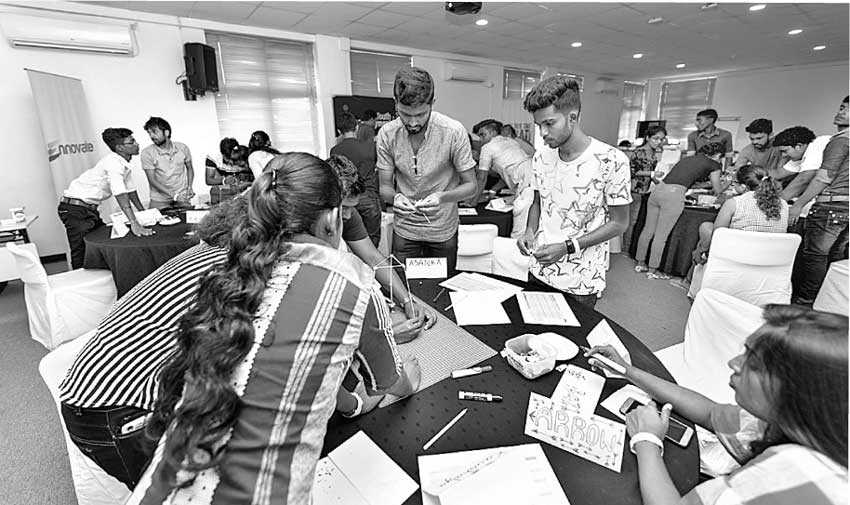Monday Feb 16, 2026
Monday Feb 16, 2026
Saturday, 5 January 2019 00:00 - - {{hitsCtrl.values.hits}}

A session at ICE workshop
 A prototype burglar alarm to catch ‘pol horu’ – burglars who steal coconuts in villages – has been developed by a team of youngsters who attended the ‘Innovation, Creativity, Entrepreneurship’ (ICE) program held recently.
A prototype burglar alarm to catch ‘pol horu’ – burglars who steal coconuts in villages – has been developed by a team of youngsters who attended the ‘Innovation, Creativity, Entrepreneurship’ (ICE) program held recently.
“Burglars steal a lot of the coconut harvest in my village in Hikkaduwa. We developed an alarm system that can send an immediate warning to the phone in the house or the security indicating the exact tree that the burglar is on,” 19-year-old P.H. Miura Milinida, a member of the group of youngsters from the Foundation of Goodness said.
Realising that it is a big problem in most areas in Sri Lanka, he and his enthusiastic team who is from different parts of the country, are now working together to finalise the app.
Talking about his eagerness to get into the ICE program, Miura said: “We got to meet the kind of people we only hear about or see on TV or the internet. It was incredible! I’m so grateful the Foundation made this possible for me and my friends.”
Thirteen members from the Foundation of Goodness – six from Monaragala, two from the north and five from Seenigama – were among 27 participants from diverse disciplines from all the nine provinces in Sri Lanka who were selected for the three-day residential camp. Supported by a team of nine facilitators the participants created innovative technology that solved real problems faced by themselves.
ICE is the brainchild of Professor Suranga Nanayakkara, the Head of Augmented Human Lab, at University of Auckland, New Zealand. He has made a name for himself internationally for his work in the field of technology and design, primarily in ‘humanising technology’.
He had designed ICE 2018 for Sri Lanka, in the same quality and vigour of the Design Thinking Program offered at Stanford D-School for $ 12,600 per participant. However, ICE is offered free of charge for Sri Lankan students. The participants are chosen after a rigorous selection process.
Commenting on the success of the program in Sri Lanka, Prof. Nanayakkara said: “We wish to empower rural Sri Lankan youth by exposing them to these ground-breaking concepts to help them transform their lives, which will enable them to make a positive impact to the society. Moving forward, we need to figure out a way to sustain this success beyond the workshop.”
Among the solutions developed was an innovative method to warn and guard against sexual harassment on school children. An easy to use smart pH level gauge which is targeted to solve a major pain-point in the tea plantation sector was another. So was a point-of-failure detection system for a rural pipeline providing fresh spring water from the mountains to households.

A group discussion
“Technology is the future, and the gainful employment of tomorrow is in the world of information technology. Young persons of Sri Lanka are hungry for more knowledge, resources and opportunities to get ahead in this field. The facilities at their disposal are limited, which is why programs like ICE are so vital in changing the paradigm,” a keen observer of the ICE program said.
He added that the program is designed with the objective of expanding the students’ thought boundaries, allowing them to appreciate, understand and apply design innovation in their efforts to identify and solve problems that impact positively on people’s lives.